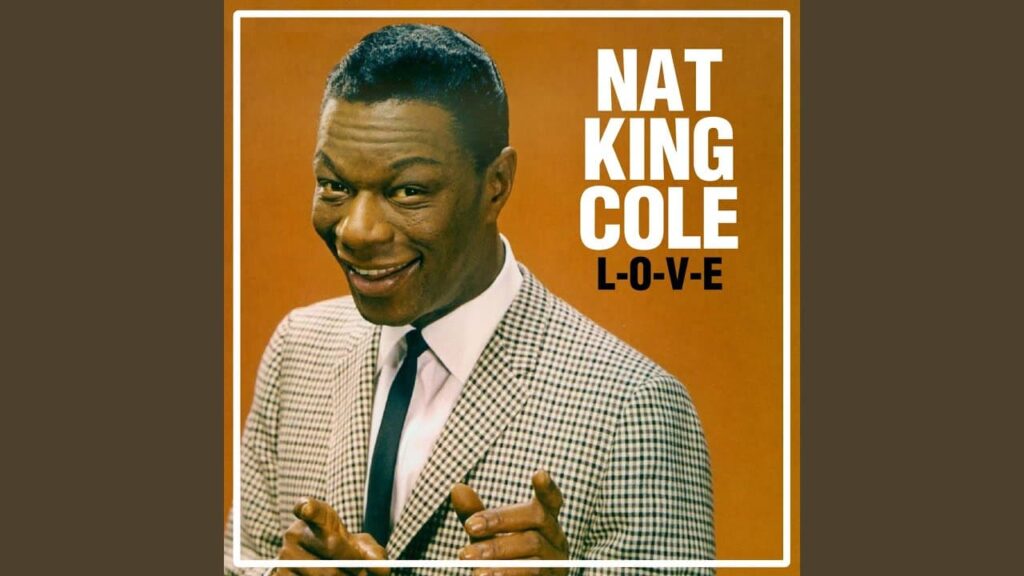
A Jazzy, Effervescent Celebration of Simple Affection, Spelled Out for the World to Hear: Nat King Cole’s “L-O-V-E”
A timeless and utterly charming ode to the uncomplicated joy of being in love, Nat King Cole’s “L-O-V-E” remains a quintessential expression of affection, delivered with his signature velvety voice and an irresistible swing. Reaching number 81 on the Billboard Hot 100 in 1964, this delightful track, the title song from his final studio album “L-O-V-E,” transcended language barriers and cultural divides with its simple yet profound message of adoration. It’s a song that still radiates warmth and happiness, a nostalgic echo of a time when love songs were often straightforward declarations of the heart, delivered with an effortless elegance.
In the mid-1960s, Nat King Cole was already a legendary figure in the music world, his smooth baritone instantly recognizable and beloved by millions. While he had explored various genres throughout his illustrious career, his ability to infuse jazz-tinged pop with an undeniable warmth and sincerity remained his hallmark. “L-O-V-E” was a perfect example of this enduring appeal, a song that embraced simplicity and joy, offering a bright and optimistic perspective on romance. Even as musical tastes were evolving with the rise of rock and roll, Cole’s timeless elegance continued to captivate audiences.
The story behind “L-O-V-E” is one of international collaboration and a song crafted for a global audience. Written by Bert Kaempfert and Milt Gabler, it was specifically intended to have international appeal, with Cole recording versions in multiple languages, including Spanish, Italian, and Japanese. This multilingual approach underscored the universality of the song’s message, the idea that love is a language understood by all. Cole’s effortless delivery and his genuine warmth transcended any linguistic hurdles, making the song a beloved standard across the globe. Tragically, this album was released shortly before Cole’s passing in February 1965, lending an extra layer of poignancy to its joyful message. It stands as a final, beautiful testament to his enduring artistry.
The meaning of “L-O-V-E” is a straightforward and utterly charming articulation of the fundamental elements that constitute love, spelled out in a way that is both simple and deeply resonant. It’s a song that breaks down the complex emotion into its core components – L for the way you look at me, O for the only one I see, V for voice that’s soft and low, and E for everything that you ever made believe. Cole’s delivery, filled with warmth and sincerity, amplifies the song’s joyful message, transforming it into a delightful affirmation of affection. The lyrics, while seemingly simple, are incredibly effective in conveying the all-encompassing nature of love, highlighting both the tangible and intangible aspects of this powerful emotion. It’s a song that resonated with those who appreciated the beauty of uncomplicated affection, a reminder that sometimes the most profound feelings can be expressed in the most straightforward way.
Musically, “L-O-V-E” is a delightful blend of pop sensibility and Cole’s signature jazz-infused style. The upbeat tempo, the swinging rhythm section, and the subtle brass arrangements create a soundscape that is both elegant and irresistibly cheerful. Cole’s smooth baritone glides effortlessly over the arrangement, his warm delivery conveying the pure joy of the lyrics. The song’s arrangement, with its clear and uncluttered instrumentation, allows Cole’s voice to take center stage, delivering the simple message of love with clarity and grace. The instrumental breaks, often featuring a playful piano or a mellow brass section, add to the song’s lighthearted and charming character.
For those who remember the mid-1960s, Nat King Cole’s “L-O-V-E” is a nostalgic reminder of a time when pop music could be both sophisticated and utterly heartwarming. It’s a song that speaks to the universal joy of being in love, the simple beauty of expressing affection, and the enduring charm of one of the most iconic voices in music history. It’s a song that feels like a warm embrace, a timeless expression of a feeling that transcends time and language, and a beautiful final note in the remarkable career of Nat King Cole.